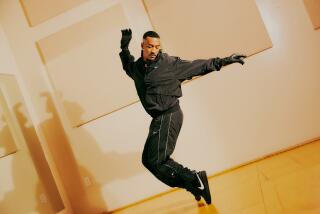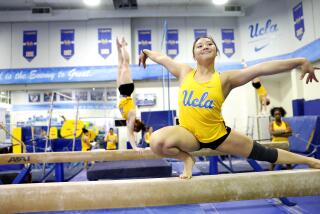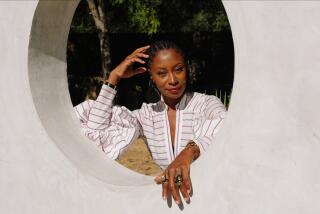ClassPass founder Payal Kadakia wants you to sweat
Payal Kadakia, 36, is executive chairwoman of ClassPass, the popular app and monthly subscription service that she founded in 2011. ClassPass gives users the freedom to take a broad range of exercise classes, including yoga, cycling, Pilates, strength training, boxing and more. ClassPass users also have access to more than 22,000 fitness studios in more than 20 countries. ClassPass plans vary by region, but on average $29 will allow a user to book up to five classes a month, $49 will get up to 10 classes a month, and $79 will book up to 16 classes a month. Wellness programs have also been added, extending choices to include things such as meditation, cryotherapy, massage and acupuncture. ClassPass is headquartered in New York, but Kadakia lives with her husband in the Hancock Park area of Los Angeles.
Dance mentor
ClassPass was kicked off by Kadakia’s search for a dance class, and dance began very early in her life in New Jersey.
“I began learning Indian classical and folk dance when I was 3,” under an instructor named Usha Patel, Kadakia said. “She was a coach, a mentor, and someone who really told me ‘this is how you take on life when you get challenged and you can’t figure out a step.’” If I was on a team, she taught me how to work together. She taught me really unbelievable lessons about how to become my best self.”
MIT guidance
The Massachusetts Institute of Technology is well known for churning out engineers, mathematicians and scientists. But Kadakia said her professors were also mentors who told her she should find her own path. She did exactly that. While continuing to grow and learn as a dancer, she obtained a degree in management science, with a concentration in operations research, in 2005.
“It is up to you to always listen,” she said. “A mentor is not necessarily someone who’s forcing you to go into a certain direction. They were guides for me. They give you a way to look to where you want to go because your life is unique. These mentors along the way will help shed some light on which direction you can go.”
Vital experience
Kadakia got a job at the Boston-based management consulting firm Bain & Co. While there, she met people who created businesses such as cosmetics company Birchbox, glasses retailer Warby Parker and Harry’s, seller of shaving equipment and men’s personal care products. She worked at Bain until 2008, rising to the post of senior associate consultant.
Hayley Barna, one of Birchbox’s co-founders, “was the first person I went to when I knew that ClassPass worked,” Kadakia said. “She told me ClassPass reminded her exactly of what happened at Birchbox. She said, ‘Here’s what you need to do.’ It was the same thing with Jeff Raider, who actually was on my first case at Bain and was one of the co-founders of Harry’s” as well as Warby Parker.
I didn’t want to build a product for a month. I wanted to build a lifestyle. And the biggest thing we’d discovered was people loved variety.
— Payal Kadakia
Learning curve
Working at Bain was like going back to school, Kadakia said. “The way Bain’s mentality and sort of philosophy works is you get on new projects, you’re learning about new industries. The second big thing that you do there is you learn all about different strategies that larger companies are going through, which obviously still helps me today in thinking through my big-picture strategies.”
Interim steps
Bain’s work schedule and demand for creative energy, however, wouldn’t allow her the freedom to pursue alternatives, so she switched jobs, working as associate director for digital strategy and business development for Warner Music Group. During that time, in 2010, she got the inspiration for her business from two sources.
“I was having conversations with people who had been very active in their lives, athletes, and they had just stopped, but were talking about wanting to be that way again,” Kadakia said. The second was the day in New York when “I had seven web pages open, each to a different dance studio in New York, unable to figure out which would be best.” She wound up not going.
First iteration
In 2011, Kadakia tried to turn her concept into reality. “The initial idea was to build a search engine for dance and fitness classes. I called it Classtivity.” She got start-up backing from TechStars’ New York City incubator in 2012. Her pitch: “Classtivity makes sure finding a class isn’t more difficult than taking one.”
But something didn’t click. “When we launched, we had about a million classes listed. No one was going to class. No one was booking anything. I realized that we hadn’t properly motivated people to go to class.”
Second iteration
“We started talking to fitness studio owners who were offering a complimentary free class to get new clients,” Kadakia said. In early 2013, “we decided to package together a month of these free classes at different studios. We called it the Passport.”
That, too, didn’t work. “The hypothesis was, people would discover for a month and then go back and choose a studio,” she said. But less than 15% of users were choosing to return to a studio and pay for classes. “Then studio owners started calling us saying, ‘Hey, why is this person coming back? You said they would only come once for free.’ We found that people were buying this product over and over again with different email addresses.”
Success
The third try worked. “I didn’t want to build a product for a month. I wanted to build a lifestyle. And the biggest thing we’d discovered was people loved variety. The trend we’d hit on was that fitness could be fun and exciting and something new that people want to do. We actually fell upon that by listening and learning. And then we launched ClassPass in June 2013 as a monthly $99 subscription to fitness classes.”
Hockey stick
“This started with ClassPass in New York City. Our second step was to try another city, Boston, to validate the success we saw in New York. We very quickly saw the same pattern. And then we continued to see the pattern as we kept launching in more cities. Los Angeles was next.” ClassPass will be in more than 30 countries by the end of this year, up from about 20 now, she said.
Lessons learned
“What we really had designed was a playbook that we could launch in every city. And we don’t actually have someone in every single city, but we have a team. We have the international team. We obviously have a team here domestically. And because of how big the platform is now, a lot of studio owners just come to us. And the amazing thing is, once we’re able to activate a city, it really just runs on its own.” ClassPass has more than 500 employees worldwide.
Adaptations
ClassPass recently did a deep dive into regional customer behavior around the world and found wide variations in how and when different areas’ residents want to work out.
“In certain places, our inventory is different — the way people are working out. In a place like Australia, people love outdoor workouts,” Kadakia said. “So we have to make sure we provide that. We’re looking for the right inventory that fits the active lifestyle of that city and country. And that’s really one of the most important things we’ve had to do. Really adapt the inventory to the fitness lifestyle.”
Personal
Kadakia has been married to her husband, Nick Pujji, for three years. They are expecting their first child. Dance is still a big part of her life. Kadakia serves as artistic director for the Sa Dance Company, which she co-founded in 2009 to express her love of Indian dance and help spread her passion for her culture. “We just performed at the Wallace in Edinburgh, Scotland, and just a few months ago, here, in L.A.,” Kadakia said. “I think to me it connects back to a little bit more of my childhood. And this idea of if you want to change how people think about something, you can. And I think for me, it’s given me this vehicle to express my Indian American identity.”







